-
 +12 +1
+12 +1The seaweed swamping the Atlantic Ocean
A sargassum bloom the width of the Atlantic Ocean caused havoc on beaches, but locals in Mexico and the Caribbean are fast finding ways to turn the seaweed invasion to their advantage.
-
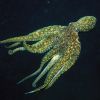 +10 +3
+10 +3Octopuses taste their food when they touch it with their arms
Octopuses use their arms to ‘lick’ prey – which researchers say adds to evidence that the cephalopods’ eight appendages are analogous to tongues with ‘hands’ and ‘brains’
-
 +16 +3
+16 +3Scientists Are Freaking Out Over The First-Ever Footage of This Bizarre Squid
Ram's horn shells are small, delicate spiral structures beachcombers can commonly find throughout the world.
-
 +17 +3
+17 +3Scientists discover 500 metre-tall skyscraper coral reef at Australia's Great Barrier Reef
Australian scientists have discovered a detached reef more than 500 metres high – taller than the Empire State Building – at the northern end of the Great Barrier Reef. The “blade-like” vertical reef about 130km off Cape York, Australia’s north-eastern tip, was found during a 3D seabed mapping exercise conducted from a ship owned by the Californian non-profit Schmidt Ocean Institute.
-
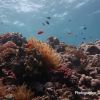 +3 +1
+3 +1Climate Change Has Killed Half of the Great Barrier Reef's Corals
A new study finds corals on the Australian mega-reef declined 50 percent between 1995 and 2017
-
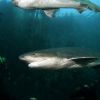 +18 +5
+18 +5Are sharks being attacked by killer whales off Cape Town's coast?
The False Bay ocean food chain in Cape Town began to change significantly in 2015 with the appearance of shark-eating killer whales.
-
 +18 +3
+18 +3Fossil upends theory of how shark skeletons evolved, say scientists
The partial skull of an armoured fish that swam in the oceans over 400m years ago could turn the evolutionary history of sharks on its head, researchers have said. Bony fish, such as salmon and tuna, as well as almost all terrestrial vertebrates, from birds to humans, have skeletons that end up made of bone. However, the skeletons of sharks are made from a softer material called cartilage – even in adults.
-
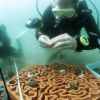 +16 +4
+16 +4Hong Kong's terracotta tile army marches to the rescue for coral
In 2018, a super-typhoon destroyed 80% of the corals in Hoi Ha Wan bay off the Sai Kung peninsula in Hong Kong. In the city’s strongest storm since records began, winds reached 155mph (250km/h) and battered the reefs, leaving behind mostly scattered debris and broken coral skeletons. A few coral species survived, but these will likely take decades to regrow to their former state.
-
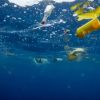 +16 +2
+16 +2Atlantic microplastic 'weighs millions of tonnes'
There are 12-21 million tonnes of tiny plastic fragments floating in the ocean, scientists say.
-
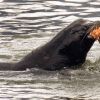 +10 +3
+10 +3US allows killing sea lions eating at-risk Northwest salmon
U.S. authorities on Friday gave wildlife managers in Washington, Oregon and Idaho permission to start killing hundreds of sea lions in the Columbia River basin in hopes of helping struggling salmon and steelhead trout.
-
 +10 +1
+10 +167 more tons of marine debris has been removed from the Pacific
The crew of the Ocean Voyages Institute returned to land after 35 days on the water.
-
 +14 +3
+14 +3Incredible new species of walking sharks discovered in Australia
Scientists documented four new species of walking shark that they say have developed the ability to walk very recently. Walking sharks use their fins to physically walk along the seafloor rather th…
-
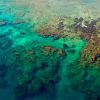 +2 +1
+2 +1Climate change to destroy all of Earth’s coral reefs by 2100
New research says climate change could devastate nearly all of Earth’s coral reef habitats by 2100. Among the existing, around 70-90% of coral reefs are likely to disappear in the next 20 years because of warming oceans, acidic water, and pollution, said scientists from the University of Hawaii Manoa.
-
 +3 +1
+3 +1Shark finning: why the ocean's most barbaric practice continues to boom
The recent seizure of the biggest shipment of illegal fins in Hong Kong history shows the taste for shark is still going strong
-
 +17 +2
+17 +2Great white shark diet surprises scientists
You'd be surprised where great white sharks spend a lot of their time hunting prey. Understanding how these predators feed is important for managing human-shark interactions. World-first research into shark stomach contents from University of Sydney and NSW Government scientists.
-
 +2 +1
+2 +1World's deepest octopus captured on camera
A "Dumbo" octopus is photographed at a depth of 7,000m in the Indian Ocean's Java Trench.
-
 +21 +4
+21 +4Oceans can be restored by 2050, say scientists
Researchers say there are good reasons to be optimistic about the future of our oceans.
-
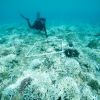 +37 +7
+37 +7Nearly All Coral Reefs Will Disappear Over The Next 20 Years, Scientists Say
Over the next 20 years, scientists estimate about 70 to 90% of all coral reefs will disappear primarily as a result of warming ocean waters, ocean acidity, and pollution. Expand that out to 2100 and it’s “looking quite grim,” says Renee Setter, a marine scientist at the University of Hawaii in Manoa. By 2100 there will be nearly zero suitable coral habitats remaining, eliminating nearly all living coral reef habitats.
-
 +3 +1
+3 +1Reef-Building Corals Transmit Epigenetic Adaptations to Their Offspring That Can Combat the Effects of Global Warming
For the first time, a team of marine biology and environmental genomics researchers at NYU Abu Dhabi (NYUAD) and King Abdullah University of Science and Technology (KAUST) have demonstrated that epigenetic modifications in reef-building corals can be transmitted from parents to their offspring. This discovery, reported in a new study in the journal Nature Climate Change, not only enhances the biological understanding of corals, it also opens up new approaches to stem the loss of this foundation species of marine ecosystems.
-
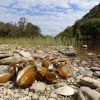 +24 +6
+24 +6Scientists Don't Know Why Freshwater Mussels Are Dying Across North America
Mussel species are dying en mass in rivers across the Pacific Northwest, Midwest and South—likely from unidentified pathogens
Submit a link
Start a discussion




















